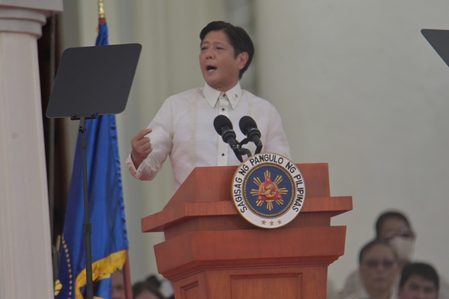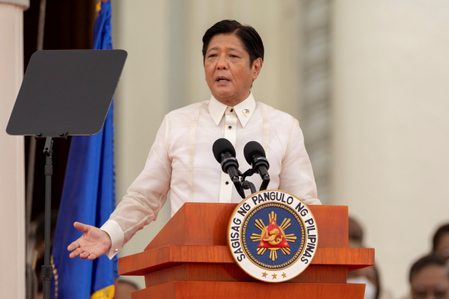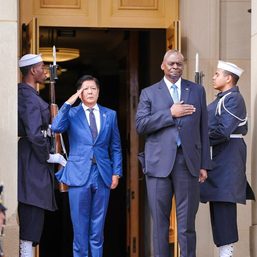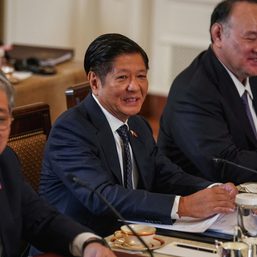SUMMARY
This is AI generated summarization, which may have errors. For context, always refer to the full article.
![[OPINION] War of the words: Thoughts on the Marcos inaugural speech](https://www.rappler.com/tachyon/2022/07/tl-war-of-the-words.jpg)
Do you know anyone who made a point of not watching Ferdinand Marcos Jr.’s speech for his presidential inauguration? Yeah, me, too. But concerned citizens of all political leanings did sit through it, for all kinds of reasons: cheering Marcos on, sating their own morbid curiosity, fulfilling a grim civic duty, or searching for clues as to what might come next.
After having watched the official footage myself, I can say that doing so is especially important for people anxious about a Marcos presidency, and still reeling from an electoral result due in no small part to historical distortion campaigns. The speech was rich with indicators as to how Marcos plans to package his administration moving forward.
Other articles will doubtless make important analyses of his words on climate resilience, economic recovery, and the like. However, in this piece, I want to draw your attention to a pattern Marcos takes on when presenting his approach to these goals.
Several times throughout his speech, Marcos promised to get things done without delays or excuses. He also said that his administration plans to take full responsibility for running and ruling the country. Citizens should not have to worry about taking the government’s functions on themselves.
On the surface, these words may sound reassuring. But they sound alarm bells in the minds of citizens who are already observing a curtailing of civil liberties, and unjustified targeting of oppositional voices. It is not hard to see that authoritarian tactics can be presented as “getting it done.” People who question these tactics will be accused of getting in the way of progress and sabotaging national unity. A more polished spin on “puro reklamo, walang gawa,” if you will. On a related note, critics can be accused of usurping government functions, when a proper citizen should quietly obey. This is the general narrative that oppositionists should be prepared to counter.
On a more specific note, we can see that the Marcos camp is still mustering its rhetorical weapons against former VP Leni Robredo, despite having ostensibly defeated her in the recent elections. Marcos’ current messaging sounds like a shot fired at the heart — the still-beating heart — of the Pink movement, as embodied in the anthem “Rosas.” Set the Marcos speech alongside the lyrics to that song. “Rosas’” chorus famously begins, “Hindi ko maipapangako…,” while the Marcos speech promises to complete tasks no matter what. “Rosas” focuses on praising the courage, discernment, and goodness that enables Filipinos to (potentially) steer their country’s future. The inaugural address states that citizens need not worry themselves about government functions. The vote counts may be finished, but to Marcos, the fight isn’t over at all.
The question for oppositionists now is: should they radically change their strategy to bypass Marcos’ narrative, or should they focus on showing that his narrative is flawed? The answer depends on many factors. Firstly, will Marcos be able to produce tangible (or at least flashy) results? Just as importantly, will the opposition be able to demonstrate that delivery of services need not happen at the expense of democratic norms?
What is certain is that the opposition must become better not just at taking the Marcos camp seriously, but understanding the patterns in its rhetoric. The debate is not just about correcting individual pieces of disinformation through proper facts, but about how information is used to tell stories. I argue that we should already be worried that attacks on democracy will be passed down as the story of the government getting things done. The opposition should focus its words and deeds on shifting this storyline.
As I understand it, the opposition has always wanted a government that listens to its people. However, one reason that the opposition failed on May 9th was that its own listening process came too little, too late. From this key speech, we can see that the Marcos camp is still listening to the opposition, if only to figure out strategies to outflank it. Unless the opposition also learns to listen more systematically, it is likely that these strategies will prove all too successful. – Rappler.com
Jamina Vesta Jugo is a doctoral candidate in Political Science at the University of Goettingen and a part-time lecturer at the Ateneo de Manila’s European Studies Program.
Add a comment
How does this make you feel?






There are no comments yet. Add your comment to start the conversation.